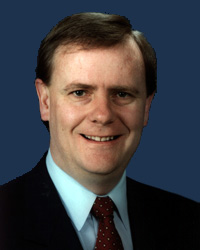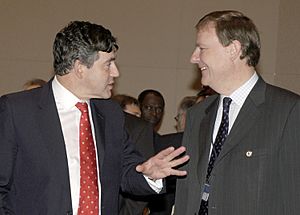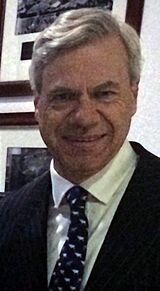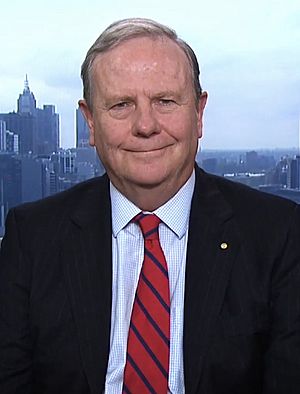Peter Costello facts for kids
Quick facts for kids
Peter Costello
|
|
|---|---|

Official portrait, 2001
|
|
| Treasurer of Australia | |
| In office 11 March 1996 – 3 December 2007 |
|
| Prime Minister | John Howard |
| Preceded by | Ralph Willis |
| Succeeded by | Wayne Swan |
| Deputy Leader of the Liberal Party | |
| In office 23 May 1994 – 29 November 2007 |
|
| Leader | Alexander Downer John Howard |
| Preceded by | Michael Wooldridge |
| Succeeded by | Julie Bishop |
| Member of the Australian Parliament for Higgins |
|
| In office 24 March 1990 – 19 October 2009 |
|
| Preceded by | Roger Shipton |
| Succeeded by | Kelly O'Dwyer |
| Personal details | |
| Born |
Peter Howard Costello
14 August 1957 Melbourne, Victoria, Australia |
| Political party | Liberal |
| Other political affiliations |
Coalition |
| Spouse |
Tanya Coleman
(m. 1982) |
| Children | 3 |
| Relatives | Tim Costello (brother) Patrick Costello |
| Education | Carey Baptist Grammar School |
| Alma mater | Monash University |
| Profession | Barrister |
Peter Howard Costello (born 14 August 1957) is an Australian businessman, lawyer, and former politician. He served as the Treasurer of Australia in the government of John Howard from 1996 to 2007. He holds the record as Australia's longest-serving Treasurer.
Costello was a member of parliament (MP) in the Australian House of Representatives from 1990 to 2009. He represented the area called the Division of Higgins. He was also the Deputy Leader of the Liberal Party from 1994 to 2007.
In September 2008, Costello became the chairman of the World Bank's new Independent Advisory Board. This board gives advice on how to prevent corruption. He was also Chairman of Nine Entertainment from February 2016 until June 2024. Today, Costello is the Chairman of the Board of Guardians of Australia's Future Fund.
Contents
Early Life and Education
Peter Costello was born on 14 August 1957 in Melbourne, Australia. He grew up in a family that practiced Christianity. He was the second of three children. His older brother, Tim Costello, is a well-known minister and used to be the CEO of World Vision Australia.
Costello went to Carey Baptist Grammar School and finished in 1974. He then studied arts and law at Monash University, graduating with honours in 1982. Peter Costello is related to Patrick Costello, an Irish immigrant who was removed from the Parliament of Victoria in the 1860s due to issues with his election.
Legal Career Before Politics
In the 1980s, Costello worked as a lawyer at the firm Mallesons Stephen Jaques. Later, he became a barrister, which is a type of lawyer who argues cases in court. He represented employers in some important workplace disputes in Australia.
In 1982, Peter Costello married Tanya Coleman. Her father, Peter Coleman, was a writer and former politician.
In 1983 and 1984, Costello represented the National Farmers' Federation in a legal case. This case was against the Australasian Meat Industry Employees Union (AMIEU). The dispute was about how workers were paid in meat processing plants. Costello helped the farmers win the case.
He also gained attention in the Dollar Sweets dispute in 1985. He successfully represented a candy company in a difficult workplace disagreement.
Political Beginnings
During his university years, Peter Costello was involved in student politics. He was part of the Social Democratic Students Association of Victoria. In 1977, he had a difficult encounter with a student politician. This event brought him into the public eye for the first time.
After university, Costello's political views became more conservative. However, he still held some modern views on social issues. In 1984, he helped start the H. R. Nicholls Society. This group focused on ideas about workplace rules.
Political Career
Starting in Parliament
In 1990, Peter Costello won a vote to become the Liberal Party candidate for the area of Division of Higgins. This area in Melbourne was a safe seat for the Liberal Party. He entered the Australian House of Representatives at 32 years old.
In his first speech in Parliament in May 1990, Costello spoke about how government should serve its citizens. He believed that the government should be answerable to the people's representatives.
After Andrew Peacock resigned, Costello supported John Hewson to become the Liberal Leader. Costello then became a shadow minister, first for Consumer Affairs and later for Attorney General.
After the Liberal Party lost the 1993 Australian federal election, Costello became the Shadow Finance Minister. He gained a higher profile, especially during the "sports rorts affair." In this event, Sport Minister Ros Kelly had to resign. This happened after it was found that she had not handled sports funding proposals correctly.
In May 1994, Hewson was replaced as Liberal leader. Costello supported Alexander Downer for the leadership. Costello became Downer's Deputy Leader and Shadow Treasurer.
When Downer resigned in January 1995, Costello did not try to become the leader. Instead, he supported John Howard. Costello became the longest-serving Deputy Leader in 2006. He broke the record held by Sir Eric Harrison.
Federal Treasurer (1996–2007)
The Liberal/National coalition, led by John Howard, won the 1996 Australian federal election. Peter Costello became the Federal Treasurer at 38 years old. This was the same age Howard was when he became Treasurer in 1977.
As Treasurer, Costello managed to bring the federal budget back into surplus. This meant the government spent less than it earned. This helped to greatly reduce the government's debt. He presented twelve federal budgets in a row, with ten of them showing a surplus. During his time, he eliminated the government's net debt of $96 billion.
During Costello's time as Treasurer, inflation, interest rates, and unemployment generally stayed low.
Tax Reform and Other Policies
Tax reform was a big focus for Costello. Even though John Howard had promised not to introduce a Goods and Services Tax (GST) in 1996, it became Liberal Party policy for the 1998 Australian federal election. The GST was passed into law with help from the Australian Democrats in the Australian Senate.
In 1998, Costello and his wife Tanya, along with Tony Abbott and his wife Margaret, successfully sued author Bob Ellis. This was because Ellis made false statements about them in his book.
Costello supported changing Australia to a republic at the Australian Constitutional Convention 1998. He believed that Australia was already an independent nation. However, he felt that the idea of a monarchy did not fit with modern democratic values. He said, "The temper of the times is democratic; we are uncomfortable with an office that appoints people by hereditary."
Costello supported the 1999 Australian republic referendum. This vote was about whether Australia should become a republic.
After the 2001 election, he faced some criticism. This was because he did not secure funding for a promise to expand the Medicare safety net.
In 2002, the "Baby Bonus" scheme was brought back by the government. This scheme aimed to help families with the costs of having a child. It also aimed to encourage more births in Australia. Costello famously encouraged Australians to "have one for mum, one for dad and one for the country."
In February 2006, Costello gave a speech where he discussed the government's view on marriage. He stated that marriage should only be recognized between heterosexual couples. In the same speech, Costello also spoke about "multiculturalism." He said that immigrants must accept Australian values, calling it "not optional."
Leadership Discussions

Costello was expected by many to become the Liberal leader after John Howard's second term as prime minister. However, this did not happen. In July 2003, Howard announced he would lead the government into the 2004 Australian federal election. This led to speculation that Howard would delay his retirement even further.
In July 2006, a discussion about a possible agreement between Howard and Costello regarding leadership was made public. Costello confirmed that such a discussion had happened. Howard denied that it was a formal agreement.
On 12 September 2007, Howard confirmed he would step aside after the next election if re-elected. He also said that Costello would be his "logical successor."
A federal election was held on 24 November 2007. The Coalition lost the election.
After the 2007 Election
Many people thought Costello would become the Liberal leader after the 2007 election. However, the day after the election, he announced he would not seek the leadership. This was a surprise, as John Howard had endorsed him in his concession speech. A week later, Costello suggested he might not serve his full three-year term in Parliament.
As opposition leader Brendan Nelson faced challenges, there was talk that Costello might change his mind. In August 2008, he said he would not challenge Nelson for the leadership.
In September 2008, just before his book The Costello Memoirs was released, Costello confirmed he would not seek the party's leadership. He said he would leave politics when it suited him. This led to Malcolm Turnbull becoming the new leader. Costello remained a backbencher, meaning he was a regular Member of Parliament without a special role.
On 18 September 2008, Costello was appointed to the World Bank's new Independent Advisory Board (IAB). This board gives advice on how to prevent corruption.
On 15 June 2009, Costello announced he would retire from Parliament at the next federal election. However, on 7 October 2009, he announced he would resign sooner. He officially resigned on 19 October 2009. This led to a special election, called a by-election, in his area.
Life After Politics
Peter Costello was a member of the Board of Guardians of the Australian Government Future Fund from December 2009 until February 2024. This fund helps manage Australia's long-term investments.
Costello is a managing partner at BKK Partners, a company that advises other businesses. He also leads the advisory board of ECG Advisory Solutions.
In 2008, his book, The Costello Memoirs, became a best-seller. He also wrote a regular column for Fairfax Media newspapers until 2013.
In February 2016, Costello became chairman of Nine Entertainment. He resigned from Nine in June 2024.
Honours
On 26 January 2011, Peter Costello was given a high honour. He was appointed a Companion of the Order of Australia (AC). This was for his "eminent service to the Parliament of Australia." It recognized his work in developing important economic policies. These policies included changes to taxation, foreign investment, superannuation, and company rules. It also recognized his roles with global financial organizations.
Images for kids
-
Gordon Brown (left) and Peter Costello (right) at the International Monetary Fund 2002 annual meeting
 | James Van Der Zee |
 | Alma Thomas |
 | Ellis Wilson |
 | Margaret Taylor-Burroughs |







